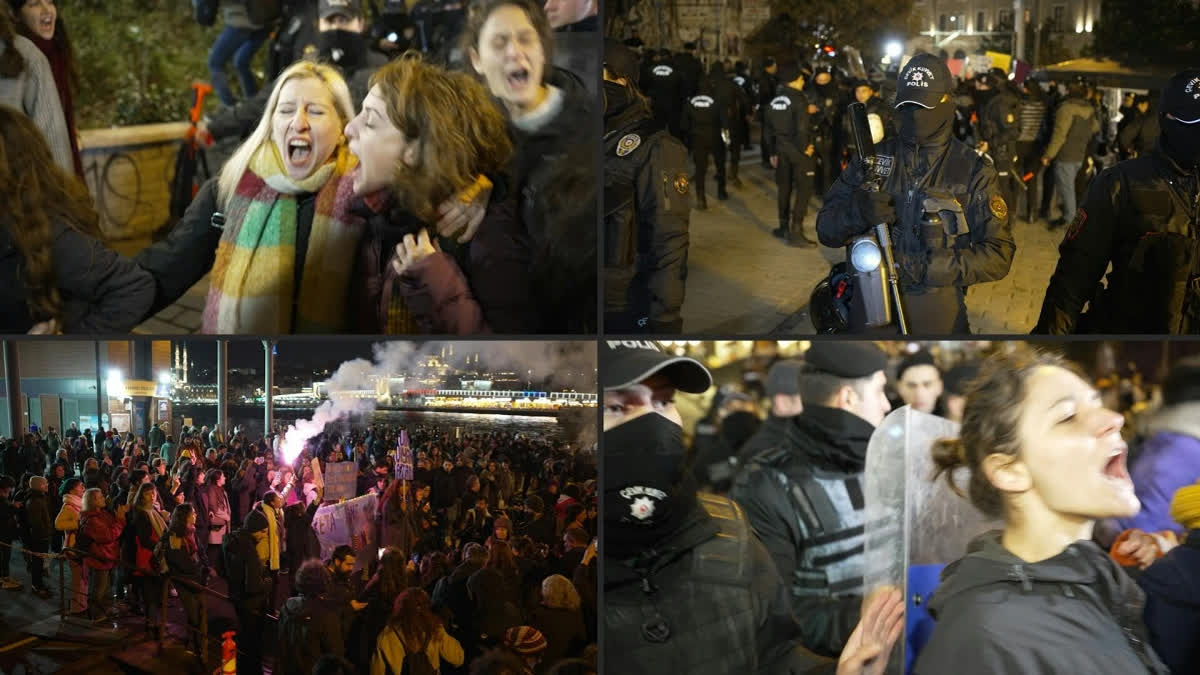Istanbul (Turkey): Filiz Demiral was at home in Istanbul when she received the phone call in August 2020 that would turn her life upside down: her 20-year-old daughter Ceyda had been found dead with the police telling her it was suicide.
But Demiral refused to believe it. As the forensic evidence emerged, it quickly became clear she had been violently attacked by a man she met online about adopting a dog -- her death sparking a years-long quest for justice from Turkey's courts that is far from over.
Four years on, Demiral, now 47, has joined the growing ranks of Turkish families fighting for justice for loved ones who died in violent circumstances, their struggle highlighted as demonstrators gathered on Monday to mark the International Day for the Elimination of Violence against Women.
Speaking to AFP on Sunday at a rally in Istanbul's Kadikoy neighbourhood, Demiral said the case went to trial with evidence showing the suspect attacked her daughter after she refused to have sex with him, her body covered with deep glass cuts as she fought for her life.
"Her arm was almost completely severed, and there were five deep cuts to her throat and jaw and other parts of her body," she told AFP, her voice quaking with pain and anger.
After a three-year trial, the court convicted him of murder but said he had acted out of "grief and anger" and halved his 24-year sentence, a move completely denying Ceyda's family any sense of justice.
"Refusing sexual intercourse was considered a reason for killing: the man committed this act while in pain and anger," Admiral told AFP, who has appealed to Turkey's Supreme Court and vowed to take the case to the European Court of Human Rights if necessary.
"There is no deterrence," she told AFP, saying court decisions were "not properly implemented" meaning offenders escaped justice and were free to continue their abuses such as her daughter's killer, who had a previous criminal record for violence."This encourages people, men. They kill at the slightest anger."
Victim blaming
Demonstrators were banned from marching on Sunday with police blocking another rally on Monday evening, with hundreds of officers in riot gear barricading off the streets around the central Istiklal Avenue, an AFP correspondent at the scene said.
As they began gathering, holding banners reading: "Police, out! The street is ours!" and "Erect barricades for murderers, not for women", police quickly moved to disperse them, at times kicking protesters while detaining others, the correspondent said.
They also meted out rough treatment to journalists covering the rally. In 2021, Turkey pulled out of the Istanbul Convention, a binding treaty to prevent and combat violence against women. It does not collate official figures on femicides, leaving the job to women's organisations that collect data on murders and other suspicious deaths from press reports.
Last month, at least 49 women were killed in Turkey, raising to "at least" 327 the number who have died in violent circumstances in the first 10 months of the year, feminist organisations say.
"The government doesn't publish official femicide figures, but those we collect from the newspapers only concern the obvious killings, not suspicious deaths nor the number of suicides, which remain unknown," said Leyla Soydinc, who works with the Mor Cati women's association.
Feminist organisations also collect information on violent attacks and sexual assaults by men, with "at least" 79 victims of violence in October and "at least" 58 victims of rape or other sexual abuse.
Victims' families say the lack of justice has exacerbated the situation, with abusers confident they can act with impunity.
"If the penalties had been implemented effectively, many women like my daughter would not have been murdered and other mothers would not have suffered like me," Demiral said, vowing to continue her "struggle for justice".
"I am fighting for other women. I am determined to fight until my last breath." And such leniency had even encouraged offenders, said 27-year-old Bahar Ulucay, another activist at Sunday's protest.
"This impunity has legitimised violence against women and caused an increase in femicides... Since it goes unpunished, everyone can commit violence more easily," said Ulucay, who has previously been detained for protesting against femicides. "We will keep on protesting until we can live freely until the criminals are punished," she said. "And I believe we'll win this struggle for rights."



